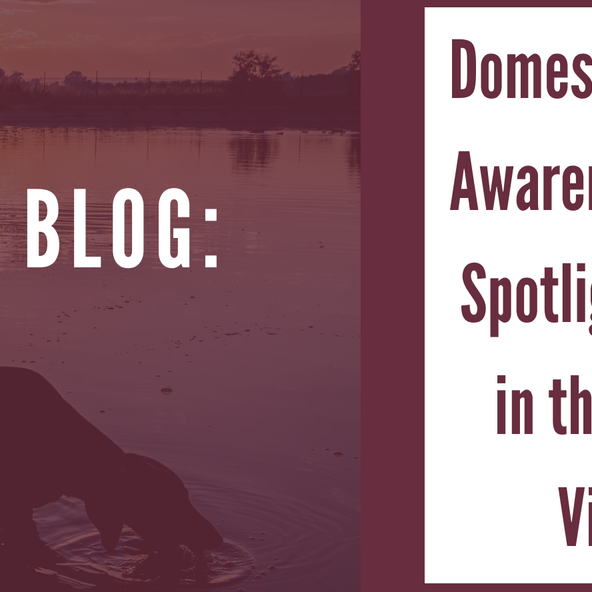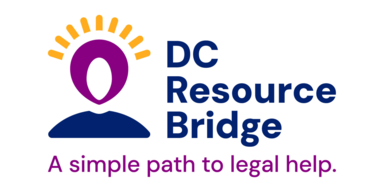
Domestic Violence Awareness Month has been observed every October for over thirty years. This year is a little different as COVID-19 has made it more difficult for survivors to get to safety. Support for domestic violence survivors is more urgent now than ever before. In these unprecedented times, Legal Aid’s Domestic Violence and Family Law Unit continues to represent domestic violence and sexual assault survivors in civil protection order cases and other family law matters in D.C. We are proud to stand by survivors in our client community and around the globe.
This month, as the pandemic wages on and many survivors remain isolated with their abusers, Legal Aid has been reminded of the important role pets play in the cycle of domestic violence. One client reached out to us after a harrowing encounter in which her abusive partner turned his aggression toward her beloved dog, beating the dog multiple times simply because she left for work. Another client told us how her husband would threaten to kill her cat, holding her pet over the balcony until she would do as he demanded. Horrible acts like these show how abusers exploit the love survivors have for their pets to exert their control and perpetuate harm.
Survivors face significant challenges when trying to reach safety with their pets. A survivor recently shared with us that she had made the decision to leave her abusive relationship, but she struggled to find a shelter that would allow her to bring her dog with her. While a 2015 poll found that 95% of pet owners consider their pet to be a member of their family, only about 10% of domestic violence shelters allow animals. Survivors trying to leave abusive partners may be faced with the difficult decision to stay in a dangerous situation or to leave their beloved furry family members behind. It is unsurprising that many survivors have delayed leaving an abusive relationship for fear of what will happen to their pets.
Fortunately, with a spotlight on this issue in recent years, the availability of pet-friendly shelters is improving. The Pets and Women Safety (PAWS) Act passed in 2018 established a federal grant program to create more options for survivors to find shelter for pets when they leave abusive relationships. The Purple Leash Project and other foundations have been hard at work raising money for pet-friendly shelters. As a result, there are now hundreds of pet-friendly shelters nationwide, up from just 4 in 2008.
Domestic violence survivors in D.C. have the option to seek protection for themselves and their pets through the Court. D.C. Code § 16-1005 allows a survivor to obtain a Civil Protection Order based on a crime committed against their pet, and that Civil Protection Order can address the care and custody of the survivor’s pet. Legislation pending before the D.C. Council would add even clearer protection for pets of survivors.
Survivors seeking to escape abuse with a pet can also access the following helpful resources:
- In D.C., the Humane Rescue Alliance Safe Haven Program provides safe housing for pets while their owners are seeking safety. Service providers and survivors can contact the Humane Rescue Alliance at 202-723-5730 to find out more about the program.
- In Virginia, Doorways for Women and Families in Northern Virginia provides shelter for survivors and their pets. Survivors in Virginia can also seek help from the Fairfax County Pet Haven Program, which provides shelter for survivors’ pets for up to 60 days, or the Animal Welfare League of Alexandria, which has a crisis care program for families with pets that provides assistance with shelter and veterinary services.
- In Western Maryland, the Dove Center in partners with HART for Animals in Maryland to provide veterinary care and shelter for pets of survivors.
- The Animal Welfare Institute Safe Havens Mapping Project and Sheltering Animals and Families Together are organizations that identify shelters across the country that provide safe housing for survivors and their pets.
- The Red Rover Safe Escape grant program offers funding to cover the cost of pet boarding while a survivor is in a domestic violence shelter.
- Additional resources are available through the Banfield Foundation.
Please join us in spreading awareness for Domestic Violence Awareness Month by checking out the D.C. Coalition Against Domestic Violence’s Calendar of Events. We also invite you to get involved with Legal Aid’s work to support survivors in D.C. and join us in wearing purple on October 22 for Purple Thursday.
Get Help 24/7 from the National Sexual Violence Hotline at 1-800-656-4673.




